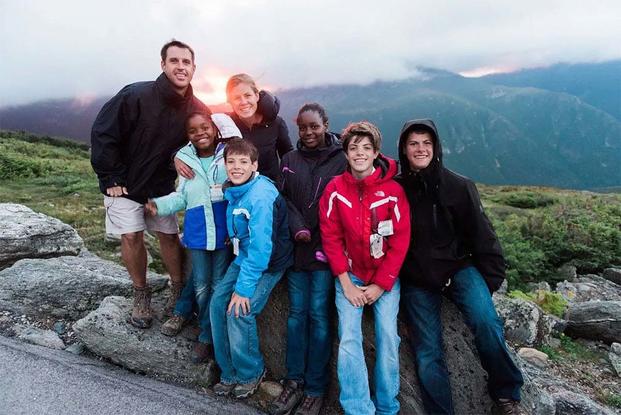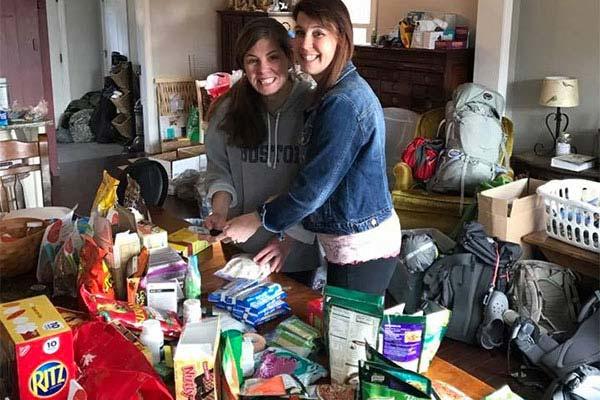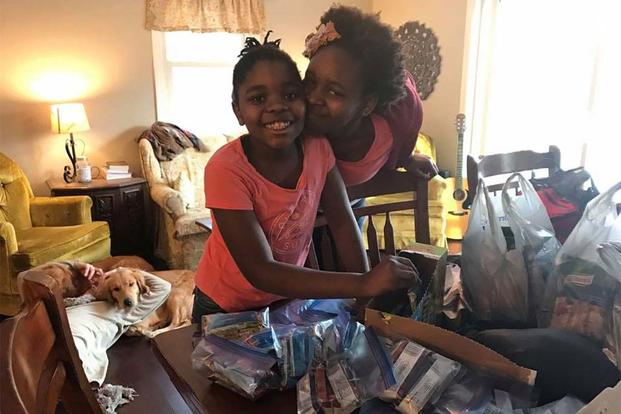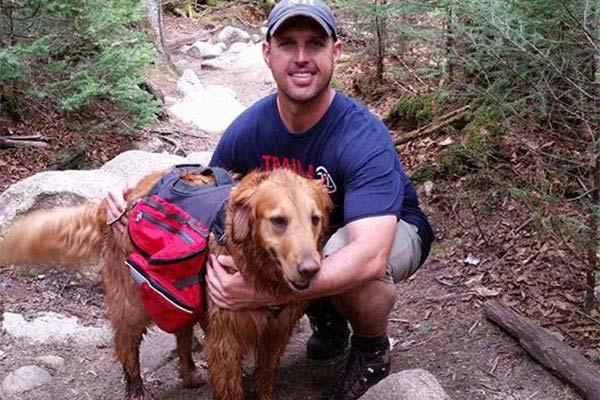Chief Warrant Officer 3 Ryan Owen's world was at the brink of total implosion.
A four-tour Army combat veteran, Ryan left his wife and five kids in New Hampshire in 2014 and drove toward his duty station at Fort Drum, New York, with a plan to put an end to their suffering through suicide.
Four inpatient treatment programs for post-traumatic stress disorder and a medical retirement later, he is now actively chasing healing from PTSD and learning to cope with a traumatic brain injury.
But as he worked to piece his family back together over the last year, Ryan and his wife Jeri Lynn realized the treatment they need to heal the scars of war is more dramatic than just getting out of the Army and seeking medical help.
They need to take a really, really long walk.
That's why on March 12, Ryan; Jeri Lynn; their five kids ages 8 to 16; and his Golden Retriever service dog Belle plan to embark on a dramatic six-month thru-hike of the Appalachian Trail.
About 2,180 miles long, the Appalachian Trail starts in Springer Mountain, Georgia, and stretches over the Smoky Mountains, through Shenandoah and up the East Coast, terminating on Mount Katahdin, Maine.
The Owens plan to walk every inch of it as they trek toward what they believe is the healing power of spending time together in the wilderness.
"I feel like there's a purpose and meaning in it, not just for me and Jeri Lynn, but for us and the kids. I do not want this to be that time in our life where we are like, 'Wow, that really sucked' and to just leave it at that," said Ryan, who medically retired this year. "We call the starting on the trail 'the first next step.' We're going to be taking hundreds of thousands of steps on it, but it's our first next step."
Ryan hopes on the trail both he and his family can experience a psychological phenomenon known as "post-traumatic growth," a period of positive personal growth that can follow a traumatic event.
"It seems to me that all of the focus is on the syndrome and the effects that it has on me and my family, which it definitely has. But I'm searching for the growth aspect. Not just for me, but for all of us," he said. "But when I look at it, that's not something that can be done on a four-day weekend type thing. ... The level of [trauma] we've encountered, it just has to be this."
That post-traumatic growth may very well be what World War II veteran Earl Shaffer, believed to be the first person to thru-hike the Appalachian Trail, was talking about in 1948 when he told a friend that he planned to "walk off the war."
Between now and early September, walking off the war is exactly what Jeri Lynn hopes the entire family is able to do.
"I feel we all have things to walk off. If you ask me about the war, my experience is different than Ryan's, and our children's experiences are different as well," she said. "I'd heard that a day in the woods heals a week at work. ... Ryan has spent 180 weeks in combat, and we plan to do about 180 days. We kind of think about each day healing a week of the combat experience."
The healing the Owens expect to do on the trail is more than just walking really far and breathing in fresh air, Ryan said. He expects that they'll work through their experiences through tough, candid conversations and plenty of concentrated alone time.
"I'm trusting that all of us are going to get really honest with ourselves and with each other," Ryan said. "It could be about how I hurt them, about how [PTSD] manifested on them with my service, or how they've done things to me, or how I've been gone for 80-plus months in this [Army] career."
Logistically, getting ready to be away from home for six months' hiking took serious planning and research to make sure the kids could handle the strain of hiking and not carry too much weight in their packs. Since there's no way to effectively prepare to spend months on a trail other than just doing it, the family plans to use a hiking mileage technique knowns as "scaling in."
Their first day on the trail will cover 3.5 miles, with a gradual increase each day over the first few weeks. The girls' packs are between 10 and 15 pounds, with the older boys carrying up to 30 pounds, Jeri Lynn carrying about 25, and Ryan hauling the most weight at about 60 pounds.
The family has about 30 resupply points planned throughout the trail, where they will have the option to stay in a hotel, do laundry and get a hot shower. Their supplies will be refitted there by pre-ordered Amazon Pantry shipments of food for the trail, plus boxes from designated friends full of treats they'll enjoy before they hit the trail again the next day.
The Owens, who adopted their daughters from the Democratic Republic of Congo in 2013, will be the only known family of seven with a dog to thru-hike. Zoe Owen, who will turn 9 on the trail, will miss the distinction of being the youngest thru-hiker by four years.
Although dogs have thru-hiked the trail, doing so is not common because non-service animals are not permitted on some National Parks trails, and dog food adds substantial weight to already full packs and can be very expensive. Leaving Belle home, however, was not an option, and a company that makes dog food designed for trail use is providing the Owens with Belle's food at-cost.
Because much of the trail has access to cell phone service, Jeri Lynn plans to homeschool the kids on the trail through books loaded to their iPads and the Classical Conversations curriculum. All of the children will be chronicling their experiences regularly on blogs hosted on the family's website. They plan to be home in time for the start of the school year after Labor Day, while oldest son Taylor, a rising high school senior who will turn 17 on the trail, will start online courses through Liberty University while still hiking.
Whether the Owens cover the entire trail over their six-month adventure is irrelevant, Ryan said. That's not what this adventure is about. Instead, he said, this is about moving forward.
"We're not actually setting out to thru-hike. That may very well happen, but we're setting out to heal, to do things together and to think things through together and process things together that we have never gotten the opportunity to do," he said. "Thru-hiking, I would hope, is going to be a byproduct of that. And there's a day that we're looking at Katahdin and be like, 'OK, let's do this.' "
-- Amy Bushatz can be reached at amy.bushatz@military.com.

































